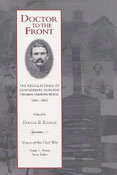Doctor to the Front
The Recollections of Confederate Surgeon Thomas Fanning Wood, 1861-1865

- Author(s): Koonce, Donald B.
- Series: Voices of the Civil War
- Imprint: Univ Tennessee Press
- Publication Date: 2000-11-01
- Status: Active
- Available in Paper: Price $24.95 | Buy Now
- Leaf eReader required for PDF ebooks
“Filled with perceptive observations about military leaders, morale in the Confederacy, life in the Southern capital of Richmond, and a range of medical topics including the treatment of wounded, . . . Confederate surgeon Thomas Fanning Wood’s wartime letters and postwar reminiscences constitute a fine addition to the roster of published firsthand testimony about the Civil War.”—Gary W. Gallagher
The Civil War was a tragic conflict that destroyed many lives, but for those trying to save lives the tragedy was often compounded. Military doctors labored through the smoke of battle where impossible conditions and fear of infection often forced them to resort to amputation, and most operations were performed without painkillers. Thomas Fanning Wood recorded his wartime experiences as a Confederate Army surgeon, and his recollections of those events allow us to hear a distinct voice of the Civil War.
As a young soldier recovering from fever at a Richmond hospital, Wood developed an interest in medicine that was encouraged by a doctor who steered him toward medical training. After only eight months of study he was made an assistant surgeon in the Third North Carolina Regiment. His narrative—drawn from his memoirs, letters from the front, and articles written for his hometown newspaper—presents a poignant and sometimes horrifying picture of what the Civil War physician had to face both under battlefield conditions and in urban hospitals.
Wood himself spent much of his time at the front, and his vivid narrative describes both a doctor’s daily activities and the campaigns he witnessed. He was present at many of the war’s major engagements: he was near Stonewall Jackson when the general fell at Chancellorsville, manned a field dressing station at the foot of Culp’s Hill at Gettysburg, and was one of the few survivors of the Union attack on the “mule shoe” at Spotsylvania when his entire division was wiped out. Wood’s account also lends new insight into Jubal Early’s 1864 campaigns in the Shenandoah Valley and against Washington.
With its observations of medical care and training not found in standard histories of the war—including a description of the examination required to become an assistant surgeon—Doctor to the Front offers a unique human perspective on the Civil War. With their additional descriptions of key figures and events, Wood’s recollections combine historical significance and human interest to show us another side of that terrible conflict.
The Author: Donald B. Koonce is the great-grandson of Thomas Fanning Wood and has served on the Board of Directors of the South Carolina Historical Society and the Historic Greenville Foundation. He is president of the Koonce Group, Inc., an award-winning communications company whose productions include Daybreak at the Cowpens, a documentary for the National Park Service.
